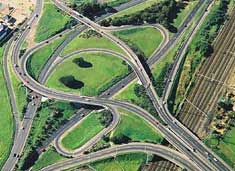'Greening' the 2010 World Cup
Shaun Benton
30 August 2006The Global Environment Facility (GEF), the world's largest funder of projects to protect the environment, plans to help South Africa with the "greening" of its public transport system ahead of the 2010 Football World Cup.
South Africa has already earmarked more than R3.5-billion to upgrade the country's bus and rail services for 2010.
Monique Barbut, the newly appointed chief executive of the GEF, said on Monday that the Fund aimed to use its financial muscle to bring environmental benefits to the government-led plan already under way.
The GEF recently received a US$3.13-billion boost, with 32 governments agreeing to finance its projects over the next four years.
It is currently holding its first ever assembly in Africa, with representatives of 176 member governments, international institutions, NGOs and the private sector meeting in Cape Town.
South Africa, which is now also a donor country to the GEF along with China and India, stands to get a bigger share of GEF financing than it has received in the past, Barbut said on Monday.
The United Nations Development Programme (UNDP), a key GEF partner, has already made US$11-million available, to follow an initial $200 000 to be used in evaluating key public transport projects, regional UNDP coordinator Martin Krause said.
'Green' alternatives
The GEF is exploring ways of ensuring sustainable transport initiatives that deliver greenhouse gas reductions "above and beyond those currently planed," the GEF said in a statement, adding that it was hoping to demonstrate the benefits of alternative fuels and green technologies like bio-diesel, bio-ethanol and fuel cells.
It would also be looking at cycling and pedestrian routes that could feed into bus networks, offering attractive alternatives to the private car.
Mathabatha Mokonyama, deputy director-general for integrated planning and intersphere coordination in the Department of Transport, said the government was considering a car ban within a two-kilometre radius of all World Cup stadiums in 2010 to encourage greater use of public transport.
He told BuaNews that public transport projects for 2010 would tie in with the government's taxi recapitalisation programme, adding that up to 80% of the country's taxis would be recapitalised - upgraded, safer and modernised - by 2010.
He said the government was also looking into the possibilities of fuelling recapitalised taxis and buses with "greener" fuels such as bio-ethanol.
Football stars Ronaldo and Zinedine Zidane have given the plan their backing. In a statement released by the UNDP, the two goodwill ambassadors said they were "delighted" that South Africa's "eco-friendly" initiative would include buses fuelled by natural gas and biomass-derived fuels like ethanol, leading to the "greening" of the 2010 World Cup.
'Move
fast'
Barbut said it was important that South Africa's municipalities gave the GEF their public transport plans "very quickly" to allow the Fund to work out appropriate financing mechanisms.
"It is very important that decisions are made in the next six months, otherwise it would be very difficult to put [financing] dynamics in place," Barbut told reporters.
Mokonyama said municipalities would need to move even faster than Barbut suggested. They should have public transport plans in place by the time the GEF council met in December to consider projects for financing, Mokonyama said.
In July, President Thabo Mbeki said the government wanted an efficient and affordable public transport system to be one of the major legacies of the country's hosting of the World Cup.
Source: BuaNews
|












